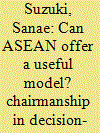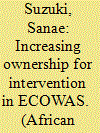| Srl | Item |
| 1 |
ID:
180648


|
|
|
|
|
| Summary/Abstract |
ASEAN has adopted decision-making by consensus. Taking ASEAN as a case study, this article aims to explain how competing positions are reconciled and international agreements reached in organisations that have adopted consensus, a process that risks non-agreement because each participant has veto power, as their sole decision-making rule. ASEAN roundtables with the foreign ministers of its member states have indeed generated some meaningful agreements. I argue that rules and customs associated with ASEAN chairmanship effectively comprise a reconciliation mechanism. The chair is empowered to play an agenda-setting role, and the combination of rotating chairmanship and a limited number of member states means that every state will enjoy the strong power, within a reasonably short period of time. Since each state knows that its turn will come soon, all are willing to allow the others to exert the power of the chair and guide consensus toward agreements that are consistent with the chair’s national interests. This article analyses the impact of a strong ASEAN chair via empirical case studies of decisions reached (or not) under consensus regarding issues where member states had conflicting interests. This analysis of ASEAN decision-making contributes to the ongoing debate on effectiveness of ASEAN and has theoretical implications for the understanding of international organisations that operate under similar institutional settings.
|
|
|
|
|
|
|
|
|
|
|
|
|
|
|
|
| 2 |
ID:
177037


|
|
|
|
|
| Summary/Abstract |
After the Cold War, not only the United Nations (UN) but also regional organisations began to engage in the internal conflicts of their member states. The Economic Community of West African States (ECOWAS) has long intervened in West African conflicts, and institutionalised its approach to interventions in 1999. Since then, member states have maintained and even increased their commitment to managing conflicts in West Africa regionally – a willingness that implies their ownership of interventions. This article argues that ECOWAS member states share ownership because they have developed a common understanding about intervention. The development of this common understanding is analysed with a focus on the origin and evolution of ECOWAS, that is, on the multi-level process of generating consensus and on the principle and practice of sharing the costs of resource mobilisation. I will show that, in practice, these processes led each state to perceive an enhanced sense of ownership in ECOWAS interventions. Case studies of ECOWAS interventions in Liberia, Sierra Leone, Guinea-Bissau and Cote d’Ivoire in the 1990s and the 2000s, the period when the organisation’s interventions became institutionalised, support the argument.
|
|
|
|
|
|
|
|
|
|
|
|
|
|
|
|